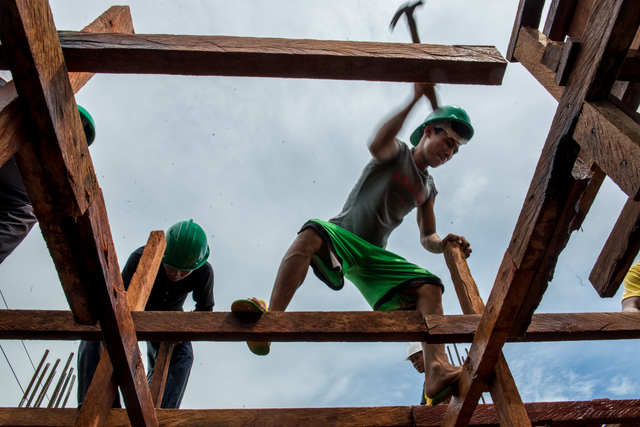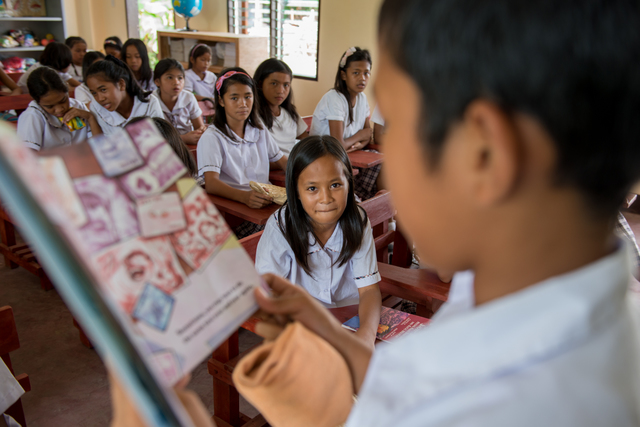A robust system to monitor progress is needed to enable effective communication about recovery. Without it, conflicting messages and directions can lead to confusion rather than clarity.
Two years after Typhoon Yolanda (international name: Haiyan) made landfall in the Philippines, recovery and reconstruction are well underway. We have learned many lessons – and are still learning – from the Yolanda response, and from how other countries have handled post-disaster recovery.
These valuable insights can help decision-makers tasked with implementing recovery to address emerging issues and strengthen resilience to future disasters – especially at a time of rising disaster risk and increasingly frequent extreme weather events. Through monitoring, evaluation, and knowledge sharing, these policies and practices can be altered as necessary to fit changing circumstances.
A key to coping with the aftermath of a disaster the scale of Yolanda is to draw on the knowledge and experience from within the Philippines and from other countries – in this region and beyond – which have had to respond to disasters.
This was an overriding message from the recent Regional Knowledge Forum on Post-Disaster Recovery hosted by the Asian Development Bank. Despite differences in institutions, budgetary resources, and the nature of disasters faced, there are common elements to each and every recovery process.
These comparisons help to put our own post-Yolanda experience in perspective. In Indonesia, following the Indian Ocean earthquake and tsunami, efficient relief operations helped to elevate expectations – ironically creating the potential for dissatisfaction when transitioning to the recovery phase.
Heru Presetyo of Indonesia’s BRR Institute, the agency tasked with rehabilitation and reconstruction, told the post-disaster recovery forum that: "Year two [after the event] is the most difficult. This is the year when expectations are high and recovery is slow."
Clearly, managing expectations is crucial. This can be done through effective communications, which should be consistent, comprehensive, and coordinated. A robust system to monitor progress is needed to enable effective communication about recovery. Without it, conflicting messages and directions can lead to confusion rather than clarity.
The second takeaway from post-disaster recoveries is that inadequate local capacity is common to almost all of them. Large-scale disasters can easily overwhelm local authorities. From damage assessment and recovery planning to implementation and monitoring, local government units may lack the technical and financial capacity to even make a successful start to the recovery process.
Technical assistance
Even large jurisdictions with plentiful resources often find it challenging to cope with the devastation wrought by a large-scale disaster. At our post-disaster recovery forum, the experience was compared by Scott Davis, who was involved in the rebuilding from Hurricane Sandy in 2012, to drinking from a fire hose when you’re at your weakest and with a thousand rules for how to do it.
Delivering well-targeted abundant technical assistance that addresses capacity needs will help matters, particularly if it creates a cadre of local experts capable of rebuilding lives, buildings and institutions with no effort spared.
Empowering local authorities is crucial, as reconstruction can’t be piecemeal. Schools, hospitals, and livelihoods must be re-established to new standards of resilience. Jobless survivors need to be taught new skills – like how to turn an idea into a small business. Indeed, businesses need extra support on issues like accessing finance to re-establish markets and supply chains when disaster strikes.
REBUILDING. Carpenters build new classrooms at the Bislig Elementary School in Tanauan, Leyte. Photo by Ariel Javellana/ADB
A third lesson is that business as usual isn’t enough when results are needed quickly on the ground after a disaster. Instead, efficient implementation should prioritize simple project designs and procurement processes, streamlined disbursements of financial assistance, and capable partners to implement project activities. Making this happen demands strong leadership, effective coordination, and the flexibility to adapt to changing priorities and needs during implementation.
Pre-existing policy problems are exposed and amplified by disaster. But this can be an opportunity to address these issues and build back better in terms of policy. Some particularly challenging policies in a recovery setting are demarcation of no-build zones in hazard prone areas and involuntary settlements, and low-cost financing for housing and livelihoods to help households and small businesses recover.
Accumulating and sharing knowledge gained during recovery on these and other issues will inform better policies that can become building blocks of future resilience.
IN SCHOOL. Students attend class inside the new classrooms at the Bislig Elementary School in Tanauan, Leyte. Photo by Ariel Javellana/ADB
Finally, the most important lesson of all is to deliver support quickly, and in a way that strengthens – not weakens – government institutions. The importance of coordinating closely with the government cannot be overstated. Development partners like ADB should take their cues from the government, aligning their financing assistance with its assessments and recovery plans.
Yolanda – like all large-scale disasters – was a tragedy, but it was also a learning opportunity to do better moving ahead. By heeding lessons now, we can save lives and improve living standards and livelihoods in the future.
Richard Bolt is the director of ADB’s Philippines Country Office
Richard Bolt is the director of ADB’s Philippines Country Office
Unquote













0 comments:
Post a Comment